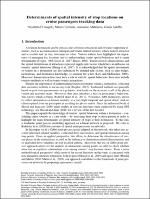Chapter Determinants of spatial intensity of stop locations on cruise passengers tracking data
Author(s)
D'ANGELO, Nicoletta
Ferrante, Mauro
Abbruzzo, Antonino
adelfio, giada
Language
EnglishAbstract
This paper aims at analyzing the spatial intensity in the distribution of stop locations of cruise passengers during their visit at the destination through a stochastic point process modelling approach on a linear network. Data collected through the integration of GPS tracking technology and questionnaire-based survey on cruise passengers visiting the city of Palermo are used, to identify the main determinants which characterize their stop locations pattern. The spatial intensity of stop locations is estimated through a Gibbs point process model, taking into account for both individual-related variables, contextual-level information, and for spatial interaction among stop points. The Berman-Turner device for maximum pseudolikelihood is considered, by using a quadrature scheme generated on the network. The approach used allows taking into account the linear network determined by the street configuration of the destination under analysis. The results show an influence of both socio-demographic and trip-related characteristics on the stop location patterns, as well as the relevance of distance from the main attractions, and potential interactions among cruise passengers in stop configuration. The proposed approach represents both improvements from the methodological perspective, related to the modelling of spatial point process on a linear network, and from the applied perspective, given that better knowledge of the determinants of spatial intensity of visitors’ stop locations in urban contexts may orient destination management policy.


 Download
Download Web Shop
Web Shop